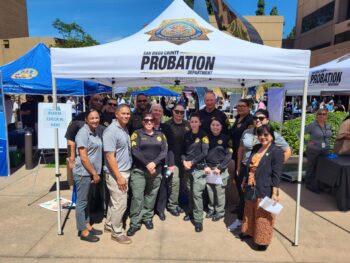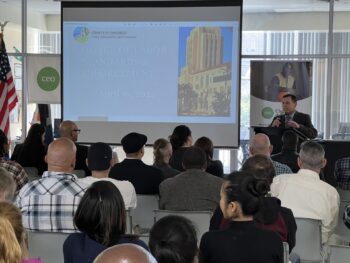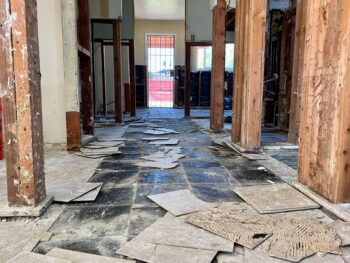It was a bad day for trolley riders in the East County without a ticket, especially those on probation or parole who might be violating their terms of release in other ways. Then again, in the case of at least one probationer, his violations might have led to another chance to turn his life around.
More than 100 law enforcement officers patrolled the trolley line as well as known hotspots for drug-related crime in the East County on Wednesday. The “Tip the Scale” operation resulted in 26 arrests, including 10 felony arrests and 16 misdemeanor arrests, according to the County’s Methamphetamine Strike Force.
A welcoming committee of some 60 Sheriff’s deputies and transit and probation officers were waiting on the platform for riders at the El Cajon trolley stop to check for tickets from about 3 until 10 p.m. Violators got a citation and talked with officers.
Officers asked violators if they were on probation or parole and if they were, they were searched for drugs, paraphernalia or weapons. Then officers checked their history to make sure they had no outstanding warrants.
If people did not have identification, officers used a machine that employs facial recognition technology to compare faces to booking photos in San Diego County. If officers suspected someone was under the influence, they did a quick-results saliva test and took a mouth swab to send to a laboratory.
Go Directly to… Treatment
In Operation Tip the Scale, non-violent offenders who test positive for drugs and who express a sincere willingness to try again can be taken straight to a residential treatment program instead of jail.
Officers found two used hypodermic needles on one rider who was on probation, and he was taken back to a command post to talk with drug treatment specialists.
Another, Donald Hays, 48, who is currently homeless, walked up to the platform with all his belongings and admitted to an officer that he was on probation and his trolley card did not have any money on it.
He said he had not checked in with his probation officer as required because he was in a ministry treatment program. Though he said he hasn’t used drugs In 45 days, he welcomed the opportunity to be put into a residential treatment center. He said it was preferable to going back to jail.
“It’s a true blessing. Usually when I see a cop, it’s straight to jail, no questions asked and they are really listening to the situation here,” said Hays, whose eyes welled up with gratitude. “I’m going to use this as an opportunity to better my life and hopefully get my kids back.”
All the while, a probation officer waited patiently to take Hays directly to a residential treatment center.
Usually, there’s a waiting list to get into these treatment centers, but officers worked with treatment centers to reserve beds for people who would be willing to go into treatment Wednesday for Tip the Scale, said John Echeverria, an Alcohol and Drug Program Specialist with Probation.
At the end of the operation, 17 violators had received counseling and two opted to go directly into treatment.
“We’re not just hooking and booking people; we’re trying to work with them to overcome their addiction,” Probation Director Jason Druxman said.
Teams of officers also checked up on probationers at homes in Santee, Lakeside, El Cajon and La Mesa.
Addiction Fuels Crime
Wednesday was the 15th Tip the Scale operation, held on the fifth anniversary of the program, which has the goal of reducing drug-fueled crime and steering offenders toward treatment rather than jail.
The strike force holds several Tip the Scale operations throughout the year and in different communities. Lately, the strike force has focused on young adults between the ages of 18 and 24 to try to intervene early with these offenders before they turn to crime to support drug addictions.
“Crime is fueled by addiction, so we have to have the prevention side. And the earlier, we get to them in age, the more successful they’ll be at beating their addiction,” said Sheriff’s Capt. James Bovet.
Police and health officials say drug dependence and addiction are significant factors in crime and recidivism.
One in four inmates in local jails across the country admit to committing their crimes to obtain money for drugs, according to the U.S. Bureau of Justice Statistics.
 Drugs and crime are certainly linked in San Diego County, with meth continuing to be a particular problem. As noted in the Meth Report Card released Tuesday, in 2012, SANDAG reported that 53 percent of male and 60 percent of female arrestees had used meth at least once in their lifetime, making it the most commonly tried illicit drug after marijuana by San Diego County arrestees.
Drugs and crime are certainly linked in San Diego County, with meth continuing to be a particular problem. As noted in the Meth Report Card released Tuesday, in 2012, SANDAG reported that 53 percent of male and 60 percent of female arrestees had used meth at least once in their lifetime, making it the most commonly tried illicit drug after marijuana by San Diego County arrestees.
In addition, 26 percent of males and 37 percent of females reported meth use in the past 30 days before their arrest.
A Strategy that Pays
In the past five years, Tip the Scale has led to more than 23,950 police contacts, 537 arrests, 2,272 treatment conversations, and 845 information packets given to individuals and family members in need of help.
Those numbers are significant; studies show that taxpayers save more than $7 in criminal justice costs for every $1 invested in treatment resources.
To get help for addiction to meth or other drugs or to report meth-related crime, call the Meth Strike Force Hotline at 1-877-NO-2-METH. The County’s Access and Crisis Line at 1-800-479-3339 is also available 24/7 to help with drug treatment or mental health issues.
The operation on Wednesday was led by the San Diego Sheriff’s Department in cooperation with local law enforcement, San Diego County Child Welfare Services/Drug Endangered Children Program, The Institute for Public Strategies and The McAlister Institute.






